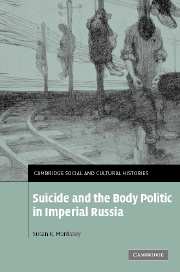Book contents
- Frontmatter
- Contents
- List of illustrations
- List of figures
- List of tables
- Acknowledgments
- Note on transliteration, translations, and dates
- List of abbreviations
- Introduction
- Part I Public order and its malcontents
- Part II Disease of the century
- 7 Sciences of suicide
- 8 Crime, disease, sin: disputed judgments
- 9 A ray of light in the kingdom of darkness
- Part III Political theology and moral epidemics
- Epilogue
- Selected bibliography
- Index
8 - Crime, disease, sin: disputed judgments
Published online by Cambridge University Press: 18 July 2009
- Frontmatter
- Contents
- List of illustrations
- List of figures
- List of tables
- Acknowledgments
- Note on transliteration, translations, and dates
- List of abbreviations
- Introduction
- Part I Public order and its malcontents
- Part II Disease of the century
- 7 Sciences of suicide
- 8 Crime, disease, sin: disputed judgments
- 9 A ray of light in the kingdom of darkness
- Part III Political theology and moral epidemics
- Epilogue
- Selected bibliography
- Index
Summary
Sociology justifies suicide, explaining it with economic and social causes; criminal anthropology, psychiatry, and psychology also justify it, denying free will and responsibility in man and encouraging the view of criminals as sick people; in addition, suicide has defenders within contemporary criminal law, who […] seek to remove it from their jurisdiction […].
Father P. Svetlov, “On Suicide,” 1890Perhaps the most ambitious of the Great Reforms was the judicial reform of 1864, the creation of Alexander II's enlightened bureaucrats. Their goal was no less than the establishment of a modern independent judiciary, which would, in turn, perform a crucial role in the modernization of Russian society as a whole. By applying the law fairly, equally, and impartially, the new courts would displace customary law and old patronage systems. Formally autonomous from provincial government within the domain of the justice ministry, they would also limit the arbitrary exercise of administrative power, especially by the governor. Although such ambitious goals were never achieved, the reform partially institutionalized an ideal of the Rechtsstaat into the Russian environment and led to a fundamental restructuring of the court system. No longer were verdicts reached in closed sessions and drawing upon written summaries. With public jury trials introduced in criminal cases, the accused now possessed the right to mount a defense, and an oral, adversarial procedure became the norm. Similarly, the weight previously accorded the confession was displaced by a new emphasis on objective standards of evidence.
- Type
- Chapter
- Information
- Suicide and the Body Politic in Imperial Russia , pp. 207 - 237Publisher: Cambridge University PressPrint publication year: 2007



